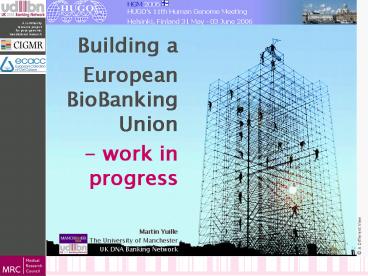Questions - PowerPoint PPT Presentation
1 / 19
Title:
Questions
Description:
No Slide Title – PowerPoint PPT presentation
Number of Views:53
Avg rating:3.0/5.0
Title: Questions
1
(No Transcript)
2
Questions
- What is the union?
- Who might join the union?
- What will EBBU do?
- Why do we need a union?
- Why now?
- Why put initial focus on disease-based
collections? - Why do population biobanks have a key role?
- What role for the European Commission?
- Why is it UDBN making this proposal?
3
What is the union?
EBBU - a post-genomic community resource research
infrastructure
4
A smaller version already exists
Steering Committee
Medical Research Council
Sample and data operations coordination
Research and development coordination
CIGMR
SD ops
CIGMR
Sample RD
ECACC
Admin
13 collectors
SD ops
ECACC
Admin
Organogram of the UK DNA Banking Network
5
Who might join the union?
- Existing and new Network of Excellence and
Integrated Project collectors - National (EU and other) and regional population
and case-based biobanks - Appropriate SMEs
- Potential members BioBabel BioSapiens
CANCERDEGRADOME COGENE Danubiobank DIABESITY
EMAS Embrace EPIC EPIGENOME Epistem Estonian
Genome Project EUROGENTEST EUROSCA Eurospan
EVGN Finnish Genome Project GENDEP
GenomEUtwin GeOSept HuGENet Humgeri Hungarian
Genome Project KoraGen Latvian Genome Project
MolDiag-Paca MolPAGE NEWMOOD Norwegian
Biobank PHOEBE Spanish Biobank Swedish Genome
Project TEMBLOR TRANS-BIG UK Biobank (for
illustrative purposes only)
6
What will EBBU do?
- EBBU is not a collaboration for investigation. It
does not specify research topics, study design or
data analysis. - EBBU is a framework for collaboration. It will
implement sample harmonisation and data
harmonisation (on demand). This will - end sample bottlenecks
- release clinical investigators, geneticists and
epidemiologists to focus on core competencies - cut costs of collection start-up and maintenance
- speed up initiation and development of
collaborations - uphold principle of free enquiry
- provide starter packs to develop post-genome
genetics
7
Starter packs
- Hardware
- Freezer
- Liquid handling robot
- Server terminals
- Software
- Open source programs suite CoMS
8
Why do we need a union?
- Geneticists need large collections to perform GWA
studies - Geneticists need further collections to replicate
and/or extend emerging GWA results on common
complex diseases - Epidemiologists need access to cohorts larger
than any single national biobank - In other words, we need an efficient mechanism of
collation. As well as of collection.
9
Why now?
- HGP and HapMap completion puts genetic analysis
of complex disease at the new frontier of
genetics. - GWA studies are underway for a first wave of
diseases. But the second wave starts now. - We need immediately to
- collate /collect
- existing /new
- sample and data
- sets / subsets
10
Why put initial focus on disease-based
collections?
- Because they are
- Timely
- Good starting point for new collectors and
funders - Smaller, quicker, cheaper than population-based
collections - Nonetheless, EBBU is extendable to
- EU-wide population-based studies (e.g. a Peoples
of Europe multi-node control population
collection) - Linking EU registries
11
Why do population biobanks have a key role?
- Existing biobank infrastructures are suited to
- act as nodes for EBBU
- provide good environment for RD in study design,
accrual and analysis - aid transition of case series to cohort studies
- Harmonisation between population biobanks is
implicit if they are EBBU nodes
12
What role for the EC?
- Conditions of new and current funding to
collectors need to include proviso that - specific steps are taken to ensure open access to
samples as well as data - these steps to include discussions with EBBU
13
Why ismaking this proposal? I
- UDBN unites collectors in
- Age-related macular degeneration colorectal
cancer hypertension Parkinsons disease
multiple sclerosis asthma and eczema acute
coronary event Type 2 diabetes unipolar
depression glomerulonephritis breast cancer
Alzheimers disease VUR ... - UDBN is a community resource project
- sample and data management under ISO9001-2000
delivered through two research infrastructures - the worlds first scientific dating agency
14
UDBN collaboration management
15
(No Transcript)
16
European
BioBanking Union
17
Why is it UDBN making this proposal? II
- UDBN embraces key principles for EBBU
- Collectors in UDBN are funded with the proviso
that samples be deposited in a DNA bank - Access to high-level data (phenotypes and
genotypes) is restricted to bona fide
investigators - Access to samples and raw data is via
collaboration (to ensure retention of trust of
subjects)
18
Why is it UDBN making this proposal? III
- UDBN collectors need to replicate
- Evidence that UDBN is scalable to EU
- A pilot project is underway with an EU partner
to - roll out CoMS
- link this partner to UDBN
- harmonise DNA quantitation (between these 2 sites
and 18 others - under P3G umbrella) - Expressions of interest from Finland, Estonia,
Sweden, Norway, France, Malta, Czech, Hungary,
Israel
19
Acknowledgements
UDBN staff Kate Dixon Andrew Platt Jay Brown
Emma Davis Kate Therburn John-Paul Allen
Hilary Corless UDBN partners
Peter McGuffin IoPsy Miriam Moffatt Oxford Karen
Morrison Birmingham Pat Munroe St Barts Bill
Ollier Manchester Michael Owen Cardiff Andy Rees
Aberdeen Nilesh J. Samani Leicester Ellen Solomon
Kings Andrew Webster IoO Julie Williams
Cardiff Martin Yuille Manchester Simon Pullum
(Azura) Colchester
- Shomi Bhattacharya IoO
- Harry Campbell Edinburgh
- Mark Caulfield St Barts
- Carl Clarke Birmingham
- Alastair Compston Cambridge
- Bill Cookson Oxford
- Malcolm Dunlop Edinburgh
- Judith Goodship Newcastle
- Alistair Hall Leeds
- Andrew Hattersley Exeter
- David Lewis ECACC
- Mark McCarthy Oxford
To express interest contact Martin.Yuille_at_manches
ter.ac.uk































